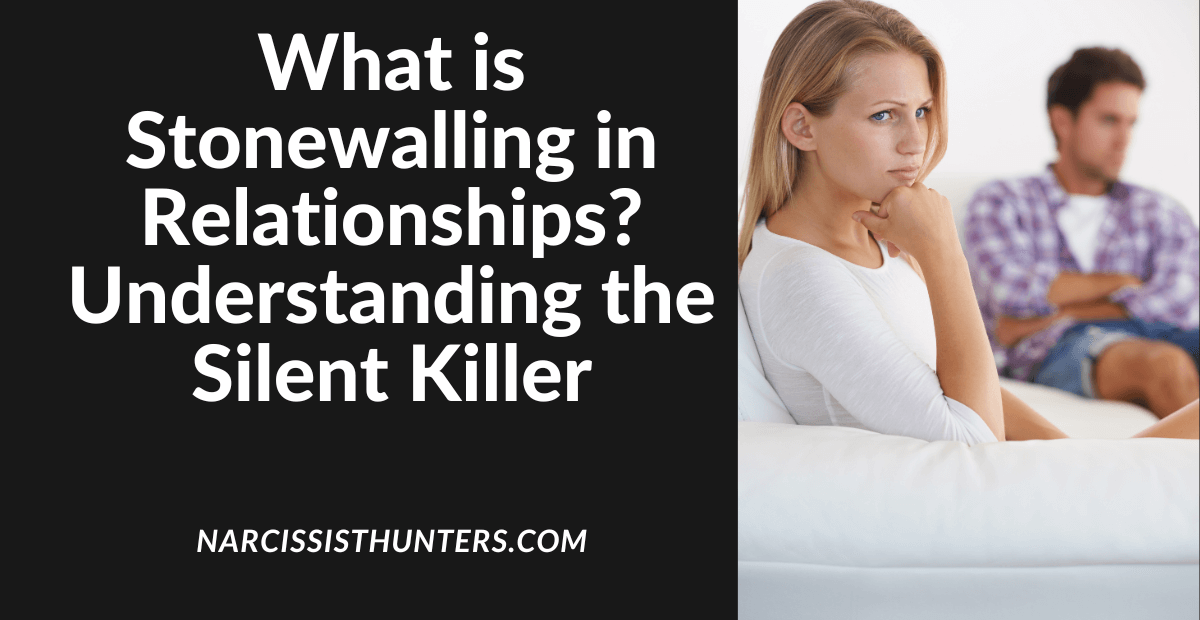In the realm of relationships, communication is the lifeblood that keeps the connection alive. However, there is a toxic behavior known as stonewalling that can suffocate this essential element, leaving partners feeling unheard, invalidated, and emotionally distant. Stonewalling involves withdrawing or shutting down during conflicts, creating a wall of silence that obstructs healthy dialogue and resolution.
In this article, we will delve into the depths of stonewalling in relationships, exploring its signs, examples, emotional effects, its relationship with gaslighting, and most importantly, how to overcome this destructive behavior to build healthier connections.
Understanding Stonewalling
Stonewalling is a defensive mechanism that people employ when they feel overwhelmed or threatened during conflicts. It involves withdrawing from the conversation, emotionally shutting down, and refusing to engage with their partner. This behavior manifests as a complete lack of response, both verbally and non-verbally, leaving the other person feeling dismissed and insignificant.
Stonewalling often stems from a fear of confrontation or an inability to handle intense emotions. The stonewaller may believe that by withdrawing from the situation, they can protect themselves from further pain or escalation. However, this approach only exacerbates the problem, as it leaves the other person feeling neglected and creates a growing divide in the relationship.
Signs of Stonewalling
Recognizing the signs of stonewalling is crucial for identifying this destructive pattern in relationships. Some common indicators include:
- Silent Treatment: The stonewaller gives their partner the cold shoulder, refusing to communicate or respond to their attempts at dialogue. This silence can last for hours, days, or even longer, leaving the other person feeling isolated and frustrated.
- Avoidance: Stonewallers actively evade conversations or situations that could lead to conflict. They may change the subject, deflect responsibility, or create distractions to avoid addressing the underlying issues. This avoidance prevents healthy communication and prevents resolution.
- Physical Withdrawal: During a conflict, stonewallers might physically leave the room or space, creating a physical barrier that mirrors their emotional detachment. This action further emphasizes their disengagement and leaves the other person feeling abandoned and confused.
- Lack of Eye Contact: Stonewallers often avoid making eye contact during conversations. They may look away, stare blankly, or become fixated on something else. This lack of eye contact signals a disconnection from the conversation and the other person’s emotions.
Examples of Stonewalling
Stonewalling can manifest in various ways, and the severity can differ from one relationship to another. Here are a few examples:
Example 1: During an argument about financial matters, John completely shuts down. He folds his arms, turns away from his partner, and refuses to utter a single word, leaving Jane feeling helpless and frustrated.
Despite her efforts to address the issue, John’s stonewalling prevents any progress or resolution.
Example 2: Lisa and Mark are discussing plans for their upcoming vacation. As Lisa tries to share her ideas and preferences, Mark avoids eye contact, stares blankly into the distance, and remains unresponsive.
This stonewalling behavior leaves Lisa feeling unheard and unimportant, causing tension and disappointment in their relationship.
Example 3: Sarah and David are in the middle of a heated disagreement. David abruptly walks out of the room, slamming the door behind him. He refuses to engage in further discussion, leaving Sarah feeling abandoned and bewildered.
David’s stonewalling intensifies the conflict and prevents them from finding common ground.
The Emotional Effects of Stonewalling
Stonewalling takes a significant toll on the emotional well-being of both partners. The silent treatment and emotional disengagement can lead to:
- Feelings of Rejection: The person on the receiving end of stonewalling often interprets the behavior as a rejection of their thoughts, feelings, and needs. They feel dismissed and unimportant, which erodes their self-esteem and sense of worth within the relationship.
- Frustration and Anger: The lack of resolution and the inability to address conflicts can breed resentment and intensify existing anger. The stonewalled partner may become increasingly frustrated at the lack of progress and the feeling of being shut out.
- Emotional Distance: Continuous stonewalling can create a chasm between partners, eroding intimacy and trust over time. The lack of open communication and emotional connection hinders the growth of the relationship and creates a sense of emotional isolation.
- Lowered Self-Esteem: Being stonewalled repeatedly can make an individual question their self-worth and contribute to a diminished sense of self-esteem. They may begin to internalize the belief that their thoughts and feelings are not valid or valued, leading to self-doubt and a negative impact on their overall well-being.
Effects of stonewalling on Relationships

Let’s explore how stonewalling can devastate relationships, delving into its far-reaching effects and the profound toll it takes on the individuals involved.
1. Feelings of Rejection and Insignificance
When one partner stonewalls the other, the silent treatment becomes a weapon of emotional destruction. It sends an unmistakable message of rejection, leaving the recipient feeling invisible and dismissed.
The emotional bond that once held them together weakens, and they question their worth within the relationship. The profound sense of insignificance erodes their self-esteem, leaving them vulnerable and emotionally wounded.
2. Intensified Frustration and Anger
Conflict is an inevitable part of any relationship, but stonewalling amplifies the frustration and anger that accompany disagreements. The stonewalled partner yearns for resolution, a chance to express their emotions and find common ground.
However, the walls of silence prevent any productive dialogue, leaving them with pent-up frustration and escalating anger. The unresolved issues fester, creating a breeding ground for resentment and further emotional turmoil.
3. Emotional Isolation and Distant Connections
Stonewalling erects a formidable barrier between partners, barricading any emotional connection. The one who is stonewalled experiences a deep sense of isolation, longing for emotional support and understanding.
Their attempts to bridge the gap are met with cold indifference, creating a void where warmth and intimacy once thrived. The relationship becomes a mere shell, devoid of emotional nourishment and genuine connection.
4. Self-Doubt and Diminished Self-Worth
Repeated exposure to stonewalling inflicts lasting damage on an individual’s self-esteem and self-worth. They internalize the belief that their thoughts, feelings, and needs hold no value, gradually eroding their sense of self.
Doubt seeps in, coloring their perception of themselves and their place in the relationship. The emotional scars of stonewalling cast long shadows, leaving them grappling with their identity and battling diminished self-confidence.
5. Erosion of Trust and Intimacy
Trust and intimacy are the bedrock of a healthy relationship, but stonewalling erodes these vital foundations. The lack of open communication and emotional engagement creates a breach of trust, raising doubts about the stonewaller’s commitment and willingness to work through challenges.
Intimacy withers as partners struggle to connect on a deep emotional level, leading to a growing chasm between them.
The emotional devastation caused by stonewalling cannot be underestimated. It tears at the fabric of relationships, leaving partners wounded and adrift.
Stonewalling and Gaslighting
While stonewalling and gaslighting are distinct behaviors, they can often coexist within toxic relationships. Gaslighting involves manipulating the other person’s perception of reality, making them doubt their sanity and memory. Stonewalling, on the other hand, is a form of avoidance and emotional withdrawal.
When these behaviors are combined, the effects can be devastating. The stonewaller’s refusal to engage in dialogue and address issues, coupled with the gaslighter’s manipulation tactics, creates a harmful dynamic where one partner invalidates the other’s experiences.
This leaves the victim feeling confused, doubting their own perceptions, and unable to address the underlying issues effectively.
How to Stop Stonewalling in Relationships?

When stonewalling becomes a recurring pattern in a relationship, it creates a toxic cycle of emotional distance and pain. But there is hope. By addressing this destructive behavior head-on, both partners can work towards healing and building healthier connections.
Here are some heartfelt strategies to stop stonewalling in relationships and nurture a more open and loving relationship.
1. Recognize the Pattern
The first step in breaking the cycle of stonewalling is acknowledging its presence. Reflect on past conflicts and instances where one or both partners withdrew emotionally.
Recognize the damage it causes and the toll it takes on the relationship. This self-awareness sets the stage for change.
2. Create a Safe Space
Establishing a safe and non-threatening environment is essential for open communication. Both partners should feel heard, respected, and validated. Agree to create a judgment-free zone where emotions can be expressed without fear of retaliation.
Building this safe space lays the groundwork for effective dialogue and understanding.
3. Take a Time-Out
When conflicts escalate and emotions run high, it’s important to take a breather. Instead of completely shutting down and withdrawing, communicate the need for a time-out.
Use “I” statements to express the need for space without leaving the other person feeling abandoned. Set a specific time to revisit the conversation when both partners are calmer and more receptive.
4. Practice Active Listening
Active listening is a powerful tool to combat stonewalling. When your partner speaks, give them your full attention. Put aside distractions, maintain eye contact, and truly listen to understand their perspective.
Show empathy and validate their feelings, even if you disagree. This fosters a sense of connection and creates an environment where both partners feel heard and valued.
5. Express Your Emotions
It’s crucial to find healthy ways to express your own emotions and needs without resorting to stonewalling. Use “I” statements to express how you feel, focusing on your own experiences rather than attacking the other person.
This approach encourages open dialogue and helps prevent defensive reactions. By sharing your emotions honestly and vulnerably, you invite your partner to do the same.
6. Seek Professional Support
If stonewalling persists despite your best efforts, consider seeking professional help. Couples therapy or relationship counseling can provide a supportive and unbiased space to address deeper issues.
A trained therapist can guide you through effective communication techniques, healing past wounds, and rebuilding trust. They can equip you with the tools needed to navigate conflicts and foster a healthier relationship.
FAQS about Stonewalling in Relationships
Can stonewalling occur in any relationship?
Stonewalling can occur in various types of relationships, such as romantic partnerships, friendships, or even family relationships.
Is stonewalling always intentional?
While stonewalling can sometimes be a deliberate choice to avoid conflict, it can also be a defense mechanism triggered by overwhelming emotions.
Are there any underlying causes of stonewalling?
Stonewalling can stem from a variety of underlying causes, including fear of confrontation, past traumas, ineffective communication skills, or a lack of emotional regulation.
Can stonewalling be reversed?
Yes, with self-awareness, effort, and a commitment to change, stonewalling behaviors can be reversed, leading to healthier communication and stronger relationships.
How long does it take to overcome stonewalling?
Overcoming stonewalling is a process that varies for each individual and relationship. It depends on factors such as the willingness to change, the extent of stonewalling behavior, and the presence of underlying issues.
Last words on Stonewalling in Relationships
Stonewalling can slowly poison the foundation of a relationship, leaving partners feeling isolated, unheard, and disconnected. By understanding the signs, examples, and emotional effects of stonewalling, we can take proactive steps to break free from this damaging cycle.
With open communication, empathy, and a commitment to change, we can build healthier, more fulfilling connections that nurture both partners’ emotional well-being.
